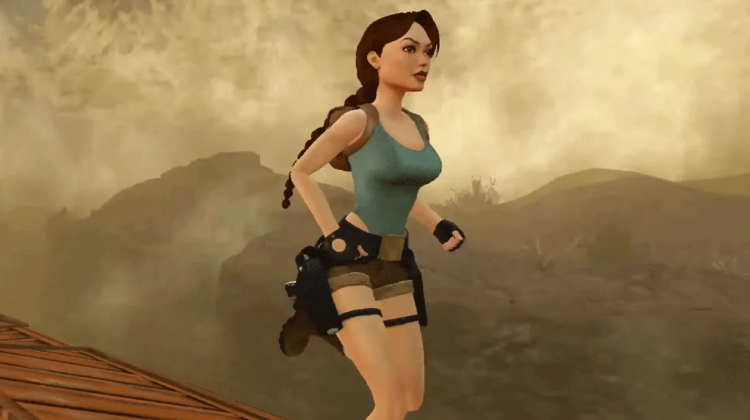Tomb Raider Voice Actor Files Lawsuit Against Aspyr Amid Growing AI Voice Acting Disputes
Françoise Cadol, best known for voicing Lara Croft in the French versions of the Tomb Raider series from its beginnings up to 2008, has initiated legal proceedings against Aspyr Media. The dispute centers on the Tomb Raider 4–6 Remastered collection, where Cadol alleges her voice was artificially replicated without permission. According to her, the publisher generated new lines with AI instead of contacting her to re-record the dialogue or licensing her past performances. She has reportedly sent a cease-and-desist demand to Aspyr.
The issue came to light after fans compared the new remastered audio with original recordings and noticed inconsistent delivery. In some segments, Cadol’s performance abruptly shifts into a noticeably robotic tone, which was then circulated online as evidence of AI use. Cadol told French newspaper Le Parisien that she had not been contacted by Aspyr at any stage of production and only became aware of the matter after players raised the alarm.
Aspyr has released Update 2 for Tomb Raider IV–VI Remastered, adding Golden Pistols, new outfits, Photo Mode filters, and a series of stability, gameplay, and localization fixes.
Cadol described the development as a breach of trust with the audience that has supported Tomb Raider for decades.
"It's a game, my voice accompanies the gamers, we play together," she said. "Tomb Raider has been followed by a lot of people over the years, for them, it's a betrayal, a total disrespect. They are angry." — Françoise Cadol
The controversy is not isolated to the French version. Brazilian voice actor Lene Bastos also reported that her work was seemingly replaced by AI in the same remastered release. Bastos explained in an Instagram video that Aspyr eventually reached out with an apology, assuring her that the AI-generated lines would be removed in a forthcoming update. However, it remains unclear whether Cadol has received similar communication or an official response from the company.
This dispute connects with a broader wave of resistance in the voice acting community against generative AI. Earlier this year, the entire French cast of Apex Legends collectively rejected an annex to their contracts that would have allowed publisher Electronic Arts to use their voices for AI training. The cast’s refusal meant risking their positions on the game, but they stated it was necessary to prevent long-term replacement by automated tools.
Pascale Chemin, the French voice actor for Wraith in Apex Legends, explained the decision in a public statement.
"We are asked to give up our expertise to train the generative AI that will replace us tomorrow," she wrote. "We are asked to agree to what we specifically fight against. We are asked to shoot ourselves in the foot. We are asked to support AI." — Pascale Chemin
The Apex Legends cast also confirmed they had delivered a joint letter of refusal to the publisher, requesting contractual protection for voice actors across the industry. Their stance mirrors concerns raised by actors worldwide, with many warning that current contracts do not adequately protect performers from having their likeness or voices replicated without fair compensation or consent.
AI adoption is accelerating throughout game development, with major publishers such as EA investing heavily in automation across design, testing, and content generation. Yet its growing role in voice work has become a flashpoint. For many actors, the concern is not about technological innovation itself but about safeguarding livelihoods in a field already marked by limited roles and inconsistent pay.
Jennifer Hale, a veteran performer known for roles in Mass Effect and Bayonetta, highlighted the broader stakes earlier this year in relation to the SAG-AFTRA strike in the United States. She argued that corporate priorities centered on maximizing long-term profit, often at the expense of the creative workforce that brings games to life.

The Tomb Raider case underscores the urgency of these disputes. Unlike the Apex Legends contract standoff, Cadol’s situation illustrates the retrospective use of AI to alter or extend past work without an actor’s involvement. Legal outcomes in this case could set precedents for how publishers handle archived performances and remasters, which are a growing part of the industry’s catalog strategy.
As of now, Aspyr has not publicly addressed Cadol’s accusations. The company promised Bastos that changes would arrive in an update within weeks, but there is no confirmation of whether the same steps will be taken for the French release. Meanwhile, Cadol’s legal action may be the first of several challenges as performers seek to draw clearer lines around their professional contributions in the age of generative AI.
The convergence of these disputes in Tomb Raider and Apex Legends illustrates a mounting conflict between voice actors and publishers. With AI technologies continuing to expand, questions about consent, compensation, and creative integrity will remain at the forefront of negotiations between performers and the gaming industry.

Comments